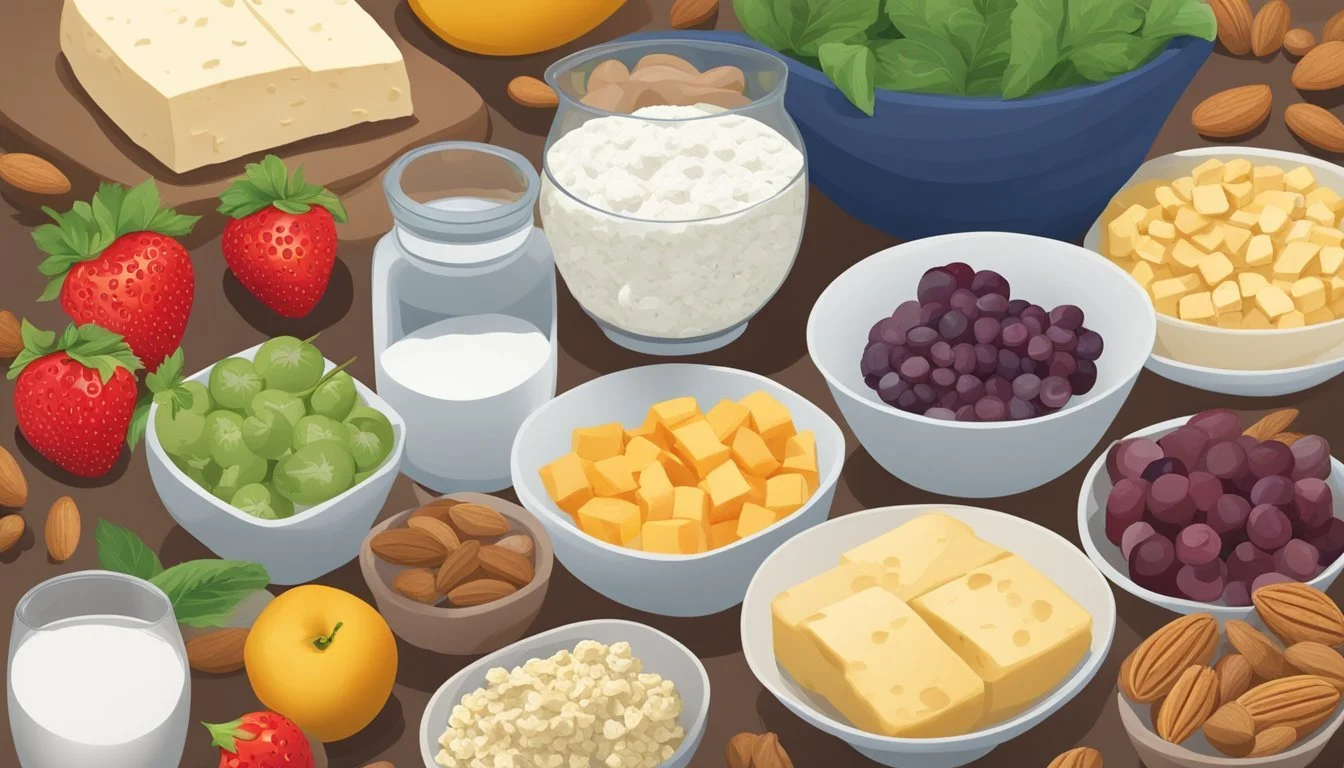Cottage Cheese Substitutes
Top Alternatives for Your Recipes
Cottage cheese (What wine goes well with cheese?) is a versatile dairy product known for its mild flavor and distinctive texture, making it a staple in a variety of dishes from lasagnas to fruit salads. However, due to dietary restrictions, taste preferences, or simply running out of it at home, individuals often seek alternatives to this unique cheese. Fortunately, there are several substitutes available that can mimic the qualities of cottage cheese in both flavor and consistency.
Finding an appropriate substitute for cottage cheese depends largely on the intended use. For cooked dishes, cheeses like ricotta or paneer maintain their structure under heat and offer a similar texture to that of cottage cheese. On the other hand, creamy options like Greek yogurt or sour cream can be used in dips or spreads where the consistency of traditional cottage cheese is desired without needing to hold its shape when cooked. It’s important to consider these factors when choosing an alternative to ensure the integrity of the dish is maintained.
Cheeses such as queso fresco and feta offer a crumbly texture akin to that of cottage cheese and can often be used in a 1:1 ratio, although the latter imparts a more tangy and salty flavor profile which may alter the final taste of the recipe. For those looking for non-dairy or vegan options, tofu or certain pureed nuts can serve as adequate replacements, particularly when texture is not the primary concern. Each alternative brings its own unique qualities to the table, allowing for flexibility and creativity in cooking and ensuring that dietary needs or preferences are met.
Understanding Cottage Cheese
Cottage cheese is a versatile dairy product known for its distinct texture and nutritional benefits. It plays a considerable role in various culinary applications, catering to different dietary needs and preferences.
Nutritional Profile
Cottage cheese is rich in protein and a good source of calcium. A typical serving contains:
Protein: Approximately 14 grams per 1/2 cup.
Calcium: Varies between brands, important for bone health.
Fat: Low-fat and regular versions available, with fat content influencing texture and flavor.
Texture and Flavor Characteristics
The texture of cottage cheese ranges from creamy to lumpy, with curds varying in size. Its flavor is described as mild and somewhat tangy, which can be creamy and refreshing. The unique texture and mild taste allow cottage cheese to blend well with various ingredients.
Culinary Uses
Cottage cheese is incredibly versatile in the kitchen. It can be eaten as a stand-alone breakfast option or incorporated into sweet and savory dishes. Common uses include:
As a filler in pasta dishes like lasagna.
Incorporated into baking recipes for added texture.
Blended into smoothies or toppings for a creamy consistency.
Common Allergens and Dietary Restrictions
Cottage cheese is a dairy product and contains lactose. This can make it unsuitable for:
Individuals who are lactose intolerant.
Those adhering to a dairy-free or vegan diet.
For such dietary restrictions, alternatives like lactose-free versions or plant-based substitutes like tofu can be considered.
Regional Variations
Different regions have their own versions of cottage cheese-like products:
Fromage Blanc and Faisselle cheese from Northern France are similar in texture.
Italian cheese variations can offer a comparable consistency.
Greek yogurt has a thicker texture but similar applications in cooking.
In place of cow's milk, goat's cheese can offer a tangy flavor profile.
Dairy-Based Cottage Cheese Alternatives
When searching for dairy-based alternatives to cottage cheese, one can find a variety of options that can replicate the texture or flavor of cottage cheese for different culinary uses, from spreads to fillings.
Cream Cheese
Cream cheese is a smooth and creamy spread that serves as a milder, denser substitution. It works well in dips and spreads due to its rich texture.
Mascarpone Cheese
Mascarpone cheese offers a whipped, rich, and velvety alternative. Its subtly sweet flavor makes it suitable for desserts but also savory dishes.
Ricotta Cheese
Ricotta is a soft cheese with a grainy texture that can replace cottage cheese in dishes like lasagna. It's less wet and has a milder flavor.
Greek Yogurt
Greek yogurt is known for its tangy taste and can be used in both sweet and savory applications such as dips or as a topping, thanks to its thick and creamy consistency.
Fromage Blanc
Fromage blanc is a fresh cheese with a mild flavor and a similar consistency to cottage cheese. It can be used in both sweet and savory recipes that require a softer texture.
Feta Cheese
Feta cheese is a salty, brined cheese that can be crumbled over salads or into dishes for a sharper flavor profile than cottage cheese.
Kefir
Kefir, while more liquid than cottage cheese, has a sour flavor that can be used in smoothies or dressings to mimic the tanginess of cottage cheese in liquid form.
Non-Dairy Cottage Cheese Substitutes
Exploring non-dairy substitutes for cottage cheese is beneficial for those seeking vegan options or with lactose intolerance. These alternatives provide similar textures and can be used in various recipes.
Tofu
Tofu, a high-protein and lactose-free option, stands out for its versatility. It can be crumbled and seasoned to mimic the chunky texture of cottage cheese. For a closer match, one can blend tofu until smooth, adjusting the texture to preference.
Almond Milk Blends
Almond milk that is blended with thickeners such as agar-agar can achieve a creamy texture resembling that of traditional cottage cheese. These dairy-free and vegan alternatives are particularly suitable for spreads and dips.
Soy-Based Alternatives
Soy-based alternatives are vegan and high in protein. They are often available in grocery stores as a direct substitute, providing a similar texture to cottage cheese and are great for those avoiding dairy.
Cashew Cream
Cashews, when soaked and blended, create a creamy texture and subtly sweet flavor. This dairy-free substitute works well in recipes requiring the richness of cottage cheese.
Coconut Cream Alternatives
Coconut cream offers a unique option for desserts and sweet dishes. It has a naturally sweet, rich flavor and when blended, it takes on a consistency similar to that of cottage cheese.
Bean Purees
Purees from beans such as chickpeas or white beans function as nutritious vegetable spreads and substitutes for cottage cheese. They are vegan, lactose-free, and adapt well into savory recipes.
Aquafaba
Aquafaba, the liquid from canned chickpeas, can be whipped to resemble egg whites. For dishes where cottage cheese is whipped into lighter textures, aquafaba is an innovative replacement.
Nutritional Yeast
Adding nutritional yeast to non-dairy substitutes infuses a savory and cheese flavor. It's a nutritious addition that enhances the overall taste profile to more closely resemble that of traditional cottage cheese.
Cottage Cheese Substitutes in Recipes
Replacing cottage cheese in recipes can be seamless when choosing the right substitute based on the desired flavor, texture, and the role it plays in the dish, whether for baking, filling, or adding creaminess to sauces.
Baking Substitutions
In baked goods, Greek yogurt or puréed silken tofu can closely mimic the moist texture that cottage cheese provides. Greek yogurt works well in recipes that call for a creamy and tangy element. On the other hand, puréed silken tofu, with its neutral flavor, is an ideal dairy-free option for maintaining moisture without altering the taste significantly.
Greek yogurt: Substitute in a 1:1 ratio
Puréed silken tofu: Use in a 1:1 ratio, blend until smooth
Savory Cooking Alternatives
For savory dishes, ricotta cheese serves as a great alternative due to its similar texture. Crumbled feta cheese can add a bolder taste, while fromage blanc or soft goat cheese provides a tangier flavor. When herbs and spices are integral to the savory dish, these cheese substitutes can complement them well.
Ricotta cheese: Substitute in a 1:1 ratio
Crumbled feta cheese: Use to taste, considering its stronger flavor
Soft goat cheese: Use in a 1:1 ratio for a tangier flavor profile
Dessert and Sweet Recipe Options
When making desserts or sweet dishes, mascarpone cheese is a recommended substitute as it has a sweet and rich profile, enhancing the overall taste. If the dessert calls for a lighter, airier texture, one could consider using whipped cream cheese blended with milk to achieve the desired consistency.
Mascarpone cheese: Use half the amount of cottage cheese called for, plus add water for consistency
Whipped cream cheese: Blend with milk in a 1:1 ratio to cottage cheese
Pasta and Italian Dishes
Italian dishes such as lasagna and stuffed pastas often feature cottage cheese. Ricotta is a traditional choice in these cases. Bechamel sauce, a mixture of butter, flour, and milk, can also stand in for cottage cheese to create a creamy layer in lasagna.
Ricotta: Use cup for cup in place of cottage cheese
Bechamel sauce: Create a roux and add milk until the desired consistency is reached
Dressings and Sauces
In dressings and sauces, the creaminess of cottage cheese is often desired. Hummus or blended cannellini beans offer a dairy-free and vegan-friendly alternative with a similar creamy consistency. Add a dash of vinegar or lemon juice to replicate the tanginess of cottage cheese if needed.
Hummus or blended cannellini beans: Substitute in a 1:1 ratio for a creamy texture
Vinegar or lemon juice: Add to taste to achieve tanginess
Tips for Choosing Cottage Cheese Substitutes
Selecting a cottage cheese alternative involves consideration of texture, flavor, and nutritional content to ensure suitability for specific recipes and dietary preferences.
Considering Texture and Consistency
Texture and consistency are pivotal when substituting cottage cheese. Options such as ricotta are similar in their creamy and smooth texture, making them interchangeable in a 1:1 ratio for dishes like lasagna or stuffed shells. For recipes requiring a firmer texture, fromage blanc or faisselle cheese can replicate cottage cheese's mild taste and semi-solid form.
Flavor Matching
The flavor profile of cottage cheese is typically mild and slightly sour, which is essential to consider for an appropriate substitute. Ricotta maintains a subtle taste, closely imitating cottage cheese in flavor-sensitive recipes. In contrast, feta and goat cheese introduce a tangier flavor, suitable for dips or spreads where the taste can complement other ingredients.
Health and Nutritional Considerations
For those seeking high-protein, low-calorie, or healthier options, the nutritional value of the substitute must align with that of cottage cheese. While cottage cheese is a source of lean protein, alternate options like mascarpone may provide higher calorie and fat content; therefore, they should be used judiciously in moderation.
Cooking and Preparation Differences
Cottage cheese can withstand high heat in cooked dishes, yet not all substitutes share this property. Some, such as blenderized cottage cheese (pureed to a creamier consistency), are ideal for cheesecakes or smooth sauces. When choosing an alternative, one must confirm it responds well under similar cooking conditions to avoid textural breakdown or separation.
Health Benefits and Nutrition of Substitutes
When considering cottage cheese substitutes, it's important to compare their nutritional profiles in terms of protein, calcium, fats, and caloric value, as these factors are crucial for dietary balance and weight management.
Protein and Calcium Content
Substitutes like ricotta cheese and Greek yogurt boast high protein levels, crucial for muscle repair and growth. Ricotta is not just a good source of protein but also rich in calcium, which is essential for bone health.
Ricotta Cheese: Approximately 14 grams of protein and 207 mg of calcium per 1/2 cup
Greek Yogurt: Around 17 grams of protein and 100 mg of calcium per 1/2 cup
Fat Content and Types
The fat content and the type of fat present in food products influence their impact on overall health. Substitutes can vary from low-fat to full-fat options, affecting the amount of saturated fat.
Non-Fat Cottage Cheese: 0.4 grams of fat, mostly unsaturated, per 1/2 cup
Tofu: Minimal saturated fat, making it a heart-healthy option
Caloric Value
Caloric density plays a key role in weight management, with some substitutes being lower in calories compared to others.
Non-Fat Greek Yogurt: Approximately 59 calories per 1/2 cup
Tofu: Roughly 94 calories in 1/2 cup
Consumers should consider the balance between protein content and caloric value when choosing a substitute to align with their dietary goals.






